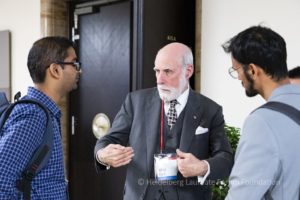
Vint Cerf talks with young researchers at HLF
Vint Cerf, known as one of the “fathers of the internet” and a recipient of the 2004 ACM A.M. Turing Award, was a participating laureate at this year’s Heidelberg Laureate Forum (HLF). Cerf currently acts as a vice president and Chief Internet Evangelist for Google. At HLF, I had an opportunity to sit down with Vint and interview him for the Computing Community Consortium’s (CCC) official podcast, “Catalyzing Computing,” which features interviews with researchers and policymakers about their background and experiences in the computing community.
Prior to our interview he also participated in a press conference where he discussed some of the projects he is currently involved with, as well as other hot topics.
Cerf was asked if he anticipates any potential problems that AI might introduce, either with regards to the Internet or more broadly. Cerf responded that he is most concerned about unexpected, emergent properties that might appear as the volume of AI systems increase and they interact with each other and with humans. He noted that the Internet in particular struggles with large, emergent property effects because it is distributed: software will encounter other software in novel ways, potentially leading to adverse effects.
Cerf was also asked about how differences in individuals can advance science, and specifically what role his hearing loss has played in his career. Cerf dispelled the idea that he got involved in electronic messaging because his wife was deaf for fifty years (she has since received cochlear implants) and because he is hard of hearing. Instead he says his wife got into email because of her book club, though he admits that because of his hearing impairment he jumped on ARPANET as soon as it was available since it was more convenient for him than phone calls, and later he joined places that had, or would let him set up, email technology. Despite not necessarily being his primarily catalyst for scientific exploration, Cerf is very interested in the ways that technology can help people with disabilities or can augment people’s capabilities.
Cerf was also asked about the potential of an “information dark age” if current computing capabilities are lost or become obsolete. Cerf expressed concern for this possibility – as an example of the power of preserving information, he cited the book Team of Rivals by Doris Kearns Goodwin, which explores the history of U.S. President Abraham Lincoln and some of his key cabinet members. This book was possible because of the extensive letters and diaries that each man wrote and which Goodwin was able to use as a resource. If a person’s key historical records only exist as tweets and texts, Cerf fears there may come a time when such a book is not possible due to a dearth of surviving material. Even if files are not lost or destroyed, they may become unreadable to newer file formats, rendering them obsolete.
Building off some of these questions, in this episode of the podcast Cerf discusses net neutrality, how to combat spoofing, the future of Internet connected devices, and the challenges of developing interplanetary Internet.
You can stream the episode in the embedded player below or find it on Apple Podcasts | Spotify | Stitcher | Google Play | Blubrry | Youtube.









